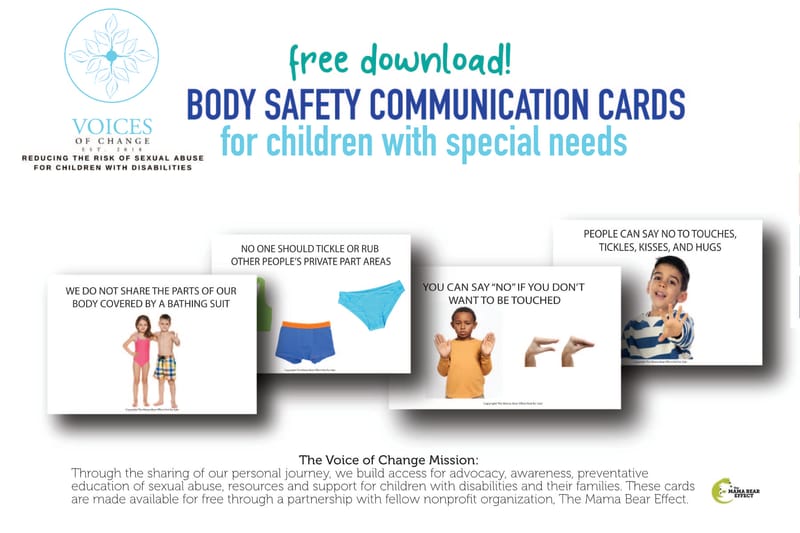About evan and Gillian says
Evan and Gillian Says! Our series of books and educational resources cover body safety, life and social skills, and other safety-related topics tailored for individuals with cognitive, developmental, and intellectual disabilities.
Recognizing the significance of education for individuals with cognitive, developmental, and intellectual disabilities is essential for heightening safety awareness and mitigating the potential for abuse while lessening its impact.
It's important for individuals with disabilities to learn:
- Body Parts / Private Parts – Teaching Proper Names of Body Parts
- Body Safety
- Boundaries
- How To Be Your Own Advocate
- How to Disclose Abuse
- Internet Safety
- It's Okay to say NO!
- It's Okay to Tell
- Surprises vs Secrets
- What Are Bad Pictures?
- What Are Good Pictures?
- What is Bad Touching?
- What is Good Touching?
- What Are "Caring Adults"
- What is Consent?
Learning safety skills is of utmost importance for individuals with cognitive, developmental, and intellectual disabilities. These skills are essential for their well-being and independence. Without direct and systematic teaching, such individuals may struggle to acquire these crucial skills naturally. This poses a significant challenge for parents, guardians, caregivers, and the individual's family, as they must find alternative methods to impart these skills effectively. Therefore, creating tailored safety programs and resources becomes vital to ensure that individuals with disabilities can lead safe and fulfilling lives.
Why is teaching children with disabilities about safety so important?
- Helps to create a safter environment
- Identifying safe people within the community, such as police and fire men
- Learning safety skills allows for critical thinking skills in various situations
- Safety skills allow an individual help with things such as: relationships, transition skills, and conflict resolution
- Teaching safety rules to help individuals develop understanding of consequences, precautions, or potential hazards
Meet the Narrators
Keep checking back to our website for the latest updates on new friends of Evan and Gillian!
Meet the characters
Keep checking back to our website for the latest updates on new friends of Evan and Gillian!
Aimee
- She eight years old - She was with Fetal Alcohol Syndrome - She has hearing issues - She has anxiety issues - She loves playing with her stuffed animals - She loves macaroni and cheese and pizza
Henry
- He is ten years old - He has Prader-Willi Syndrome - He loves sports, school, candy, and super heroes - He loves to play jokes on people
Miguel
- He is eight years old - He has Duchenne Muscular Dystrophy - He has to uses a gait walker due to low muscle tone - He loves pizza and cake - He loves people and hugs
Myles
- He is seven years old - He has Cerebral Palsy (CP) - He has Obsessive Compulsive Disorder (OCD) - At times, he has to use an upright walker - He loves sandwiches and finger foods - He is a very loving child
Zara
- She is seven years old - She is Severely Autistic - She has behavior issues due to diagnosis of autism - She is nonverbal - She avoids eye contact - She has cognitive challenges - She has inappropriate emotional reactions - She has sensory dysfunction - She loves macaroni and cheese and chicken nuggets
communication cards for children with Disabilities
Available For Free Through Our Partnership With The Mama Bear Effect

Communication Cards for children with disabilities
These communication cards for children with disabilities are made available for free through our partnership with, The Mama Bear Effect, a nonprofit organization.
Learn More